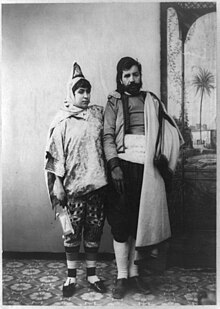
Back تاريخ اليهود في تونس Arabic Tunisian juutalaiset Finnish Histoire des Juifs en Tunisie French יהדות תוניסיה HE Yahudi-Tunisia ID Storia degli ebrei in Tunisia Italian Istorya de los djudios en Tunesia LAD História dos judeus na Tunísia Portuguese Tunus'taki Yahudilerin tarihi Turkish
This article needs additional citations for verification. (June 2018) |

| Part of a series on |
| Jews and Judaism |
|---|


The history of the Jews in Tunisia extends nearly two thousand years to the Punic era. The Jewish community in Tunisia grew following successive waves of immigration and proselytism before its development was hampered in late antiquity by anti-Jewish measures in the Byzantine Empire. After the Muslim conquest of Tunisia, Tunisian Jews experienced periods of relative freedom or even cultural apogee to times of more marked discrimination; under Muslim rule, Jews were granted legal status as dhimmi, which legally assured protections of life, property, and freedom of religion, while demanding an increased tax burden. The community developed its own dialect of Arabic, although the use of Judeo-Tunisian Arabic has decreased due to relocation from Tunisia.[1] The arrival of Jews expelled from the Iberian Peninsula, often through Livorno, greatly influenced the community's composition, inter-group relations, and customs.
The economic, social and cultural position of the community was significant compromised during the Second World War with the occupation of the French protectorate of Tunisia by the Axis powers.[2]
The Israeli Declaration of Independence in 1948 and following 1948 Arab–Israeli War provoked a widespread anti-Zionist reaction in the Arab world, to which was added nationalist agitation, nationalization of enterprises, Arabization of education and part of the administration. Jews left Tunisia en masse from the 1950s onward because of the problems raised and the hostile climate created by the Bizerte crisis in 1961 and the Six-Day War in 1967.[3] According to the Jewish Virtual Library, the Jewish population of Tunisia was estimated at 105,000 individuals in 1948.[4] These Jews lived mainly in Tunis, with communities also present on the island of Djerba. The 2022 Report on International Religious Freedom by the U.S Department of State stated that "according to members of the Jewish community, there are approximately 1,500 Jewish citizens in the country".[5][6][7]
The Jewish diaspora of Tunisia is divided between Israel and France, where it has preserved its community identity through its traditions, mostly dependent on Sephardic law and customs, but retaining its own specific characteristics.[8] Djerbian Judaism in particular is considered to be more faithful to tradition because it remained outside the sphere of influence of the modernist currents. The vast majority of Tunisian Jews have relocated to Israel[citation needed]; many have switched to using Hebrew as their home language.[1] Tunisian Jews living in France typically use French as their first language, while the few still left in Tunisia tend to use either French or Judeo-Tunisian Arabic in their everyday lives.[9]
- ^ a b Bassiouney, R. (2009). Arabic sociolinguistics. Edinburgh University Press, pp. 104.
- ^ Silver Ochayon, Sheryl (October 2011). "The Jews of Algeria, Morocco and Tunisia". yadvashem.org. Yad Vashem, the World Holocaust Remembrance Center. Retrieved November 17, 2023.
- ^ "1967 War - impact on Jews in Arab countries". sixdaywar.co.uk. Retrieved November 21, 2019.
- ^ "Jews of Tunisia". jewishvirtuallibrary.org. Jewish Virtual Library.
- ^ OFFICE OF INTERNATIONAL RELIGIOUS FREEDOM (2022). "2022 Report on International Religious Freedom: Tunisia". U.S Department of State. Retrieved March 29, 2024.
- ^ Ettinger, Yair (January 17, 2011). "Sociologist Claude Sitbon, do the Jews of Tunisia have reason to be afraid?". Haaretz. Retrieved October 4, 2012.
- ^ "The Jews of Tunisia". pjvoice.com. Retrieved November 21, 2019.
- ^ "Tunisia". eurojewcong.org. Archived from the original on March 30, 2017. Retrieved May 4, 2017.
- ^ "Arabic, Judeo-Tunisian". Ethnologue.com. Retrieved November 21, 2019.